- Category
- Life in Ukraine
From the Frontlines to Parenthood. How Fertility Clinics Help Ukrainian Soldiers Secure Their Families’ Future
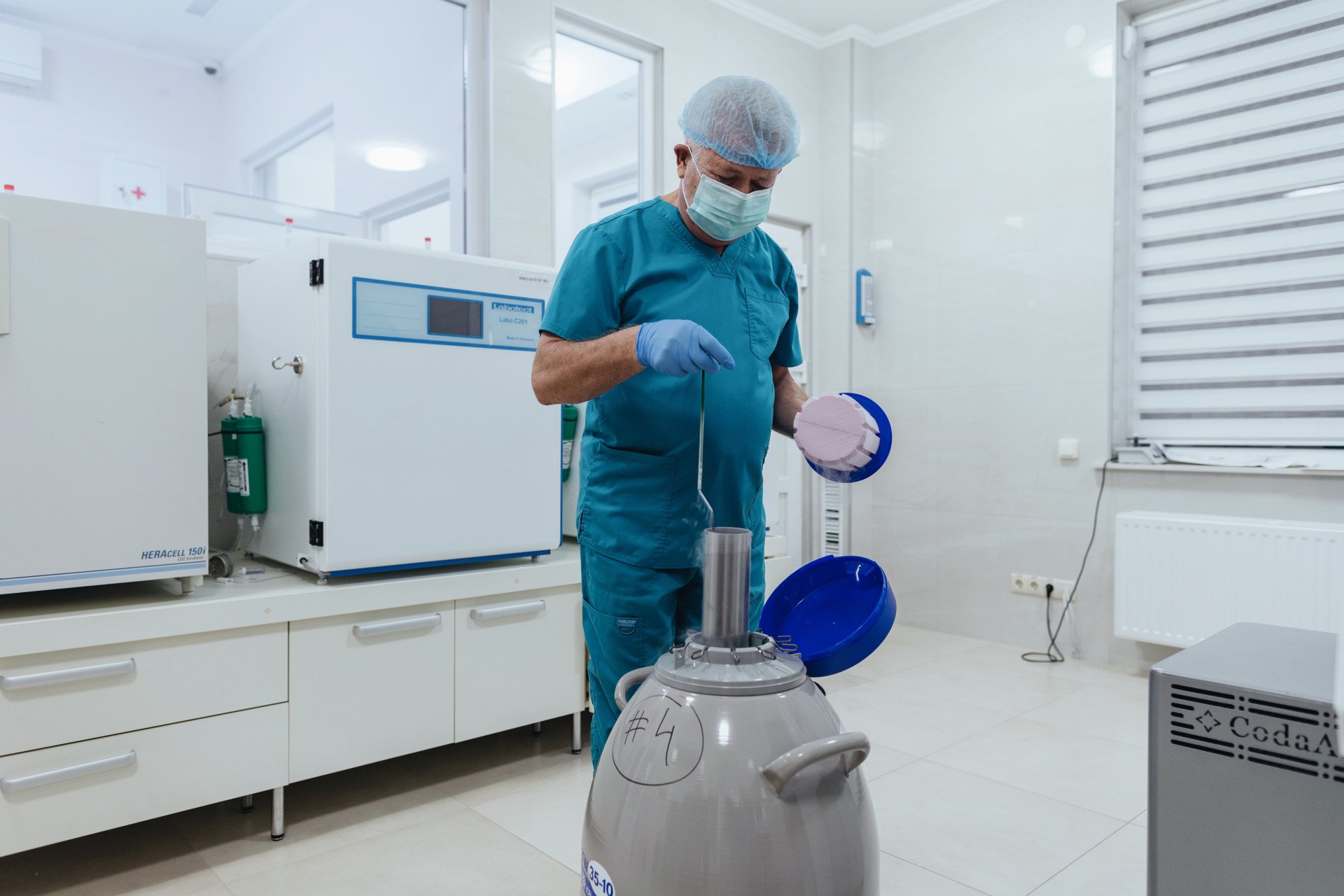
Amidst war, Ukrainians reconsider parenthood as fertility clinics across Ukraine offer free treatments to soldiers and their families.
The lobby of Dr. Stephan Khmil’s office gives two impressions: it is sterile like a medical facility should be—not a spec of dirt blemishes the pristine tiled floors where nurses and patients walk with plastic covers over their shoes. The fluorescent lights, however, illuminate the room in such a way it feels like one has stepped into God’s own waiting room. The brightness is warm and welcoming. A giant stuffed animal stork greets you from behind the front desk. Such a contrast is befitting of a place where nature’s wonder meets modern science.
Dr. Khmil’s fertility clinic in Lviv is one of hundreds around Ukraine offering complimentary sperm freezing and storage to soldiers. Still, it is perhaps the only one to offer egg-freezing and IVF treatments, free of charge, to the wives of soldiers as well.
At one o’clock on a sunny fall afternoon, the hallways are lined with couples holding hands and waiting in hopeful anticipation for their appointments. While these patients wait to bring new life into the world, across town, Yaroslav Bazylevychis is burying his wife and three young daughters after his home was struck by a Russian missile just days before. Unfortunately, this is the reality of life in Ukraine; lives are being taken as couples grapple with the existential threat of replacing them.
Replacing the irreplaceable
This was the case for Svitlana, whose husband, Bohdan, died on Ukraine’s frontlines while she was pregnant with their twins. “My husband and I dreamed of a child for two years, and when my eldest son Nazar died on August 9, 2022, the desire to have a child increased.” When Bohdan next came back on leave from the frontlines, the two turned to Dr. Khmil.
Svitlana, who is now 48, became pregnant after her first IVF treatment. She feels lucky to have had children at her age and feels that being a mature mother has prepared her to be a good mother. “We are not in a hurry anymore and just enjoy motherhood,” she says.
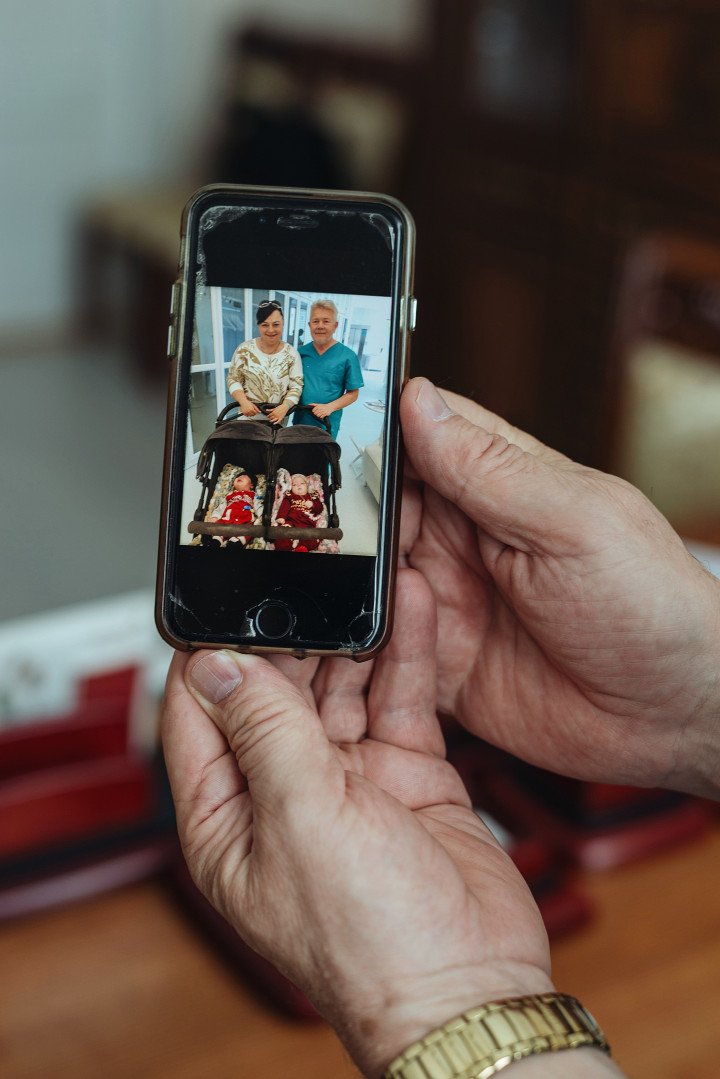
She believes the birth of her twins has also helped her to cope with the death of her son and husband, “They are my life. I can't imagine what could have been if it weren't for them.”
Though Svitlana undoubtedly faces struggles raising two infants as a single mother, she believes it's worth it, especially for military families. “The child gives hope,” she says suggesting a child may even be a motivation for survival, “The goal is to return home because they will be waiting for him.”
The child gives hope, the goal is to return home because they will be waiting for him.
Svitlana
After two and a half years of war, hope is in high demand around Ukraine, and it certainly is the prevailing message emanating from the four walls of Dr. Khmil’s clinic. As the doctor walks down the hallways, one woman lifts her gaze and reaches her hand out to him, her face full of longing, even desperation. Dr. Khmil’s service is, for many, a last resort.
A message of hope
It certainly was for Halia. Halia lives in Lviv and rarely has the opportunity to see her husband, who has been a soldier in Ukraine’s army since 2014. At the onset of the full-scale invasion, he was sent to the frontline to defend.
The couple first began trying to have a baby in 2018. After four years without success, they were recommended to Dr. Khmil. Unfortunately, in May 2022, Halia’s husband was seriously wounded and returned to Lviv for rehabilitation. Despite his injuries, they kept trying.
“He wanted to leave something after him if he went,” she explains. Thanks to Dr. Khmil's help, the couple was eventually successful, and Halia gave birth to their daughter Polina. “Of course it’s scary, but this child gives us a ray of hope and a ray of light,” she says.
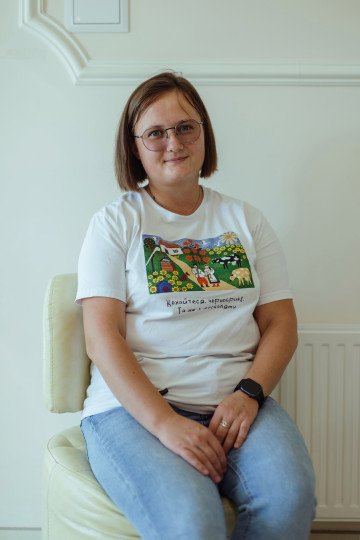

Though just one year old, Halia believes Polina has some understanding of the situation going on around her. She says the child understands that there is a war and even reacts to the sounds of explosions. Polina has seen her father just five times since she was born.
Through all of the uncertainty, Halia has no misgivings about her decision to have a child amidst the war. In fact, she urges other women to follow in her footsteps. “Children give us this hope, a vision of the future and that everything will be fine eventually,” she says.
Children give us this hope, a vision of the future and that everything will be fine eventually.
- Halia
Though Halia and her husband tried for many years to conceive, the concept of family planning in Ukraine is somewhat new. “In Ukraine [it] is not a la mode. It’s still quite "alt,"" says Dr. Maria Khmil, the daughter of Dr. Stephan Khmil, who is herself a fellow Obstetrician-Gynecologist and runs the facilities’ branch in Ternopil.
At the beginning of the war, the number of men freezing their sperm numbered in the dozens, now fertility clinics across Ukraine are storing hundreds of samples.
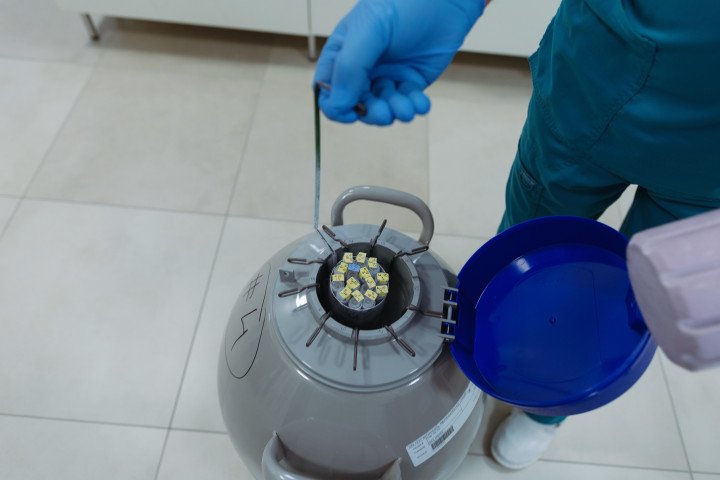
Maria explains that since the full-scale invasion, Ukrainian society has changed a lot, and people are becoming more pragmatic out of necessity. “In Ukraine the society is more traditional and having kids is even more important than in most Western countries. People want to become parents quite young, younger than in western Europe or the USA.”
Despite this desire, Ukraine has suffered from declining birth rates since the 1990s. Now as the country’s men go off to fight on the frontlines, the issue has become exacerbated.
Government initiatives
In November 2023, Ukraine’s government passed a law allowing military men to have their sperm frozen at no cost. Unfortunately, because of budgeting issues, the practice has yet to be enacted.
"At that time, we understood that a legislative solution would not be quickly adopted at the state level, so we decided to provide such services to military families voluntarily and free of charge. This was done by practically all major assisted reproductive technology clinics in Ukraine," Oleksandr Darii, a leading reproductive specialist at ICSI Clinic, told RBC-Ukraine.
However, budget hurdles are not the only thing standing in the way of artificial insemination. As the law for free sperm storage passed through the government, a second amendment was added stating that clinics must dispose of biomaterial in the event of a military member's death.
MP and author of the law, Oksana Dmytrieva, says there was a discussion about posthumous parenthood while drafting the law but legislation regarding disposal was initially left out of the bill. The amendment requiring the disposal of biomaterials that was then added sparked public outrage, with Dmytrieva herself speaking out against it in a Facebook post, "I am also submitting a separate bill to repeal this inhumane norm. With public support, we can quickly fix these rules. So that every male and female defender has the right to continue their lineage!" Even Dr. Maria Khmil tells us she appeared on Ukrainian TV Channel 1+1 to defend her patients' rights to their spouses’ samples.
In a harrowing statistic by We Have to Live, a Ukrainian charitable foundation supporting the families of fallen soldiers, 98% of women whose husbands died in the war said they would still choose to have their spouses' babies if given the option.
98% of women whose husbands died in the war said they would still choose to have their spouses' babies if given the option
We Have to Live (Foundation)
Ukraine’s government responded to the public outcry stating that it would only apply to those who store cells within a program that is not yet operational. The Minister of Health subsequently doubled down, stating that cryobanks would not dispose of the frozen material of deceased defenders whatsoever.
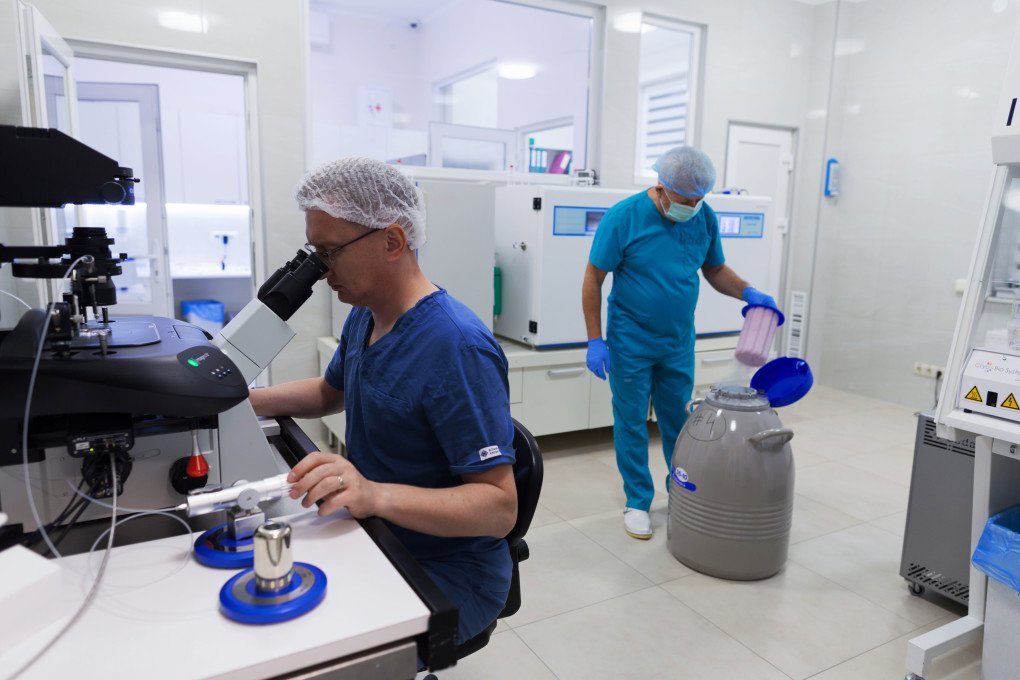
Still, it is clear that the practice of cryopreservation remains largely unregulated and relies on the goodwill of private practitioners like Dr. Khmil. The average cost of a full round of IVF treatment at Khmil’s clinic is approximately $1,000. He says he has personally invested over $500,000 by offering this free program. Without government assistance, this practice will be unsustainable for many of Ukraine’s clinics in the long term.
The ethical and legal questions surrounding bio-storage will likely also require further regulation at the end of the war. For the moment, however, it seems most Ukrainians agree that the first order of business is safeguarding the legacy of Ukraine’s defenders.
Environmental factors
Cryopreservation is not only about ensuring legacies, though. It also serves as an insurance policy against what Dr. Khmil calls “bad sperm.”
On the battlefield, men are living under extreme stress, in cold, wet conditions, and eating poor diets, which can lead to impotency. Many soldiers are exposed to harmful or toxic materials and radiation, all of which can kill sperm. Preserving their bio-matter before these men deploy is a good way to ensure future success when it comes to fertility.
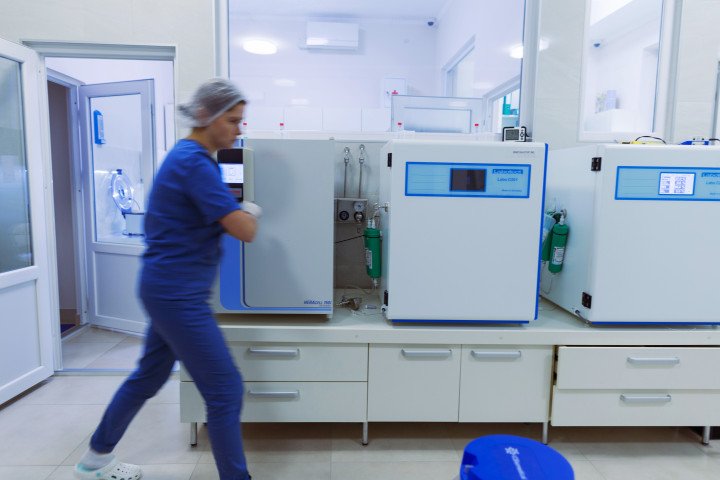
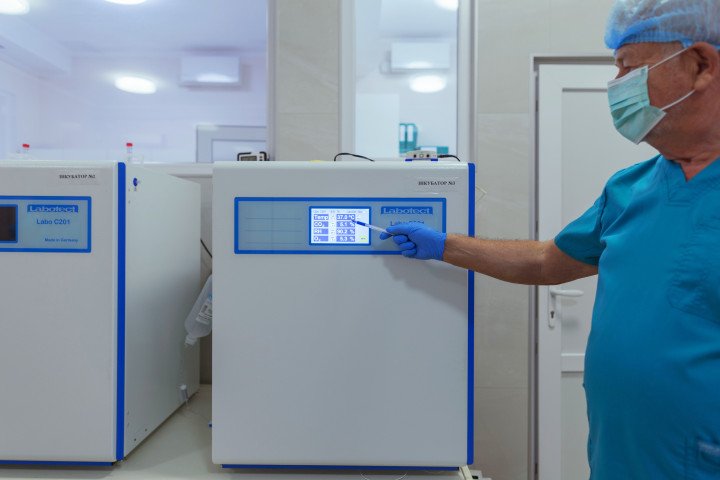
In addition to external factors, there is also the question of mental health. Many predict that PTSD from the war will be Ukraine’s next hurdle. Unfortunately, in the case of fertility, doctors agree that mental health can have equally negative effects on libido as it does on healthy sperm generation.
Preparing for the future
All of this comes at a time when Ukraine is weighing the long-term effects of the war on its population and preparing for what comes next. In April of this year, Ukraine’s government published a demographic strategy project with President Zelenskyy voicing optimism for the future, "I understand that, when the war ends, there will be a boom. I am confident in this: People will return, they will be confident in the future, confident in the future of Ukraine.”
One hundred years ago, Ukraine had one of the highest birth rates in the world. Since the full-scale invasion, it now has one of the lowest with just 186,000 babies born in the country last year. It is hard to pin this specifically on the war though, given that global birth rates in general are also on the decline.
“On the one hand, Ukraine was following a common trajectory for modern societies,” explains Doctor Brik, rector of the Kyiv School of Economics. He says that many women around the world are now having just one child. This, coupled with longer life expectancy, good health, and education, is causing a downward trend in fertility rates globally.
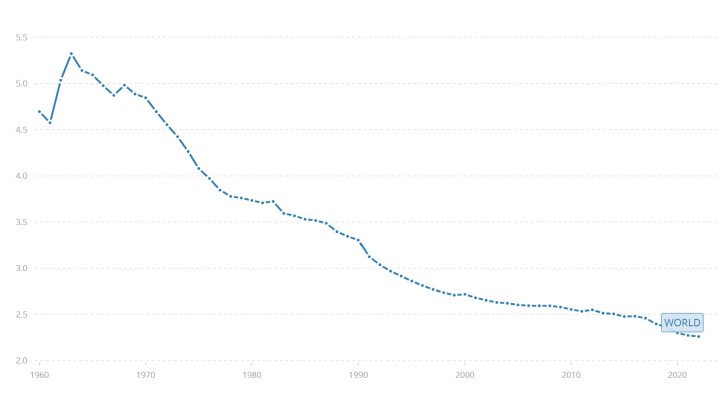
Last year Ukraine’s fertility rate fell to 0.7. For context, the US fertility rate as of 2022 was 1.7 and the UK was 1.6, according to a study by the World Bank. For a country to maintain its population size, the birth rate must be at least 2.2 children per woman, ensuring that both parents are replaced in the population.
*TFR (Total Fertility Rate) is a standard demographic indicator used internationally to estimate the average number of children that a woman would have over her childbearing years (i.e. age 15-49), based on current birth trends.
Dr. Brik says that demographers typically consider three key events when discussing population trends; birth, death, and migration. “All of these events in Ukraine are significantly influenced by the war,” says Brik, who believes that given the damage to both the economy and infrastructure of Ukraine, along with massive disruptions caused by mobilization and migration, many households have postponed the decision to expand their families.
In addition to the existential threat of war, couples in Ukraine also have to consider the economic plausibility of having a child. Dr. Brik and other experts estimate that before the invasion a nuclear household spent approximately 2 million UAH (80,000 euros) to raise one child until the age of 18, around 4,000 euros per year. This amount, Brik explains, is comparable to the average income in Ukraine, suggesting most households lack the financial capacity to adequately support children.
While military salaries in Ukraine tend to be higher than the average income, many soldiers have to invest in their own equipment, including drones, clothing, and vehicles. “This means a considerable portion of their earnings is likely allocated to sustaining their combat readiness,” says Brik.
The luxury of choice
While Ukraine’s Western allies enjoy the luxury of choice when it comes to deciding whether or not to have children, in Ukraine even this inalienable right must be weighed against the existential threat of war, especially for military parents. “What is really incredible is that so many women are ready to give birth to a child when their husband is [on the frontlines], and they are not sure if he will come back.” Dr. Maria Khmil says, “This is a sign that the Ukrainian nation is really very brave.”
Dr. Khmil and other fertility clinics around Ukraine are coming together to give military families what was taken from them with the launch of the full-scale invasion - peace of mind. As biological clocks tick, free cryopreservation services give military families an extension on family planning and the assurance that they will not miss out on fulfilling their dreams of parenthood because of the war.
-fca37bf6b0e73483220d55f0816978cf.jpeg)



-6ead6a9dd508115a5d69759e48e3cad1.jpg)
-29a1a43aba23f9bb779a1ac8b98d2121.jpeg)
-7f50738271c122a9b5e663cb80703dd6.jpg)


-554f0711f15a880af68b2550a739eee4.jpg)